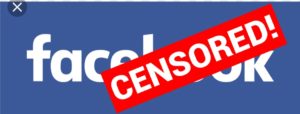
On May 2; Facebook announced that it was purging high-profile figures like Alex Jones and Louis Farrakhan from its platform and labeled them as “dangerous”. Facebook also owns Instagram; therefore Jones, Farrakhan, and others will be banned from there as well. Facebook’s own statement was “We’ve always banned individuals or organizations that promote or engage in violence and hate, regardless of ideology.”
This is both a First Amendment issue and greater than that, an international freedom of speech issue. Since the internet can be accessed almost anywhere in the world, and is accessed by almost everybody in the world, websites and their content are indeed international. Facebook has become ubiquitous within everybody’s marketing mix. More people get their news via Facebook than thru CNN, Fox News, and newspapers. Facebook has an ethical responsibility to grant equality of access for the expression of all points of view, not just their corporation’s preferred opinions.
Hatred can be found everywhere. It is part of human nature. Who does Facebook think they are to tell us, the people, what constitutes hate? Who are they to arbitrarily decide who is “dangerous”? Many people express their religious opinions on the internet. Religious thoughts and beliefs are certainly subjective. What may be one individual’s sincerely held beliefs might be viewed as hateful or dangerous by another. Religious opinions affect and divide people on matters such as abortion, homosexuality and foreign affairs. You might express a certain view that his valid in your church but viewed as hateful by Facebook.
Our Founding Fathers knew what they were doing when they talked about freedom of speech and freedom of religion. Many people have moved to the United States because they needed one or both of those freedoms. When Facebook sets itself up as an arbiter of what is right and wrong, it is impinging upon these freedoms. Furthermore, its dangerous and goes against our American culture. All beliefs, no matter how distasteful, deserve to be expressed and openly scrutinized.
The freedom to exchange ideas and information on social media is a classic application of free market principles. If someone presents information that is goofy or inaccurate, other people call it out. Alex Jones, Louis Farrakhan and others have their followers because some of the information they present resonates as true. It is too subjective to embargo their material. Let the general public decide and debate what is right and what is wrong.
Whether you agree or disagree with anyone, shutting down conversation is not the American way. This is an ongoing problem that extends beyond Facebook. Third world dictatorships like to muscle out dissenting opinions. We cannot let our country become like that. Where do we draw the line? If the American government allows this to happen now, what type of censorship will it allow in the future?
In Liberty,
George Brikho